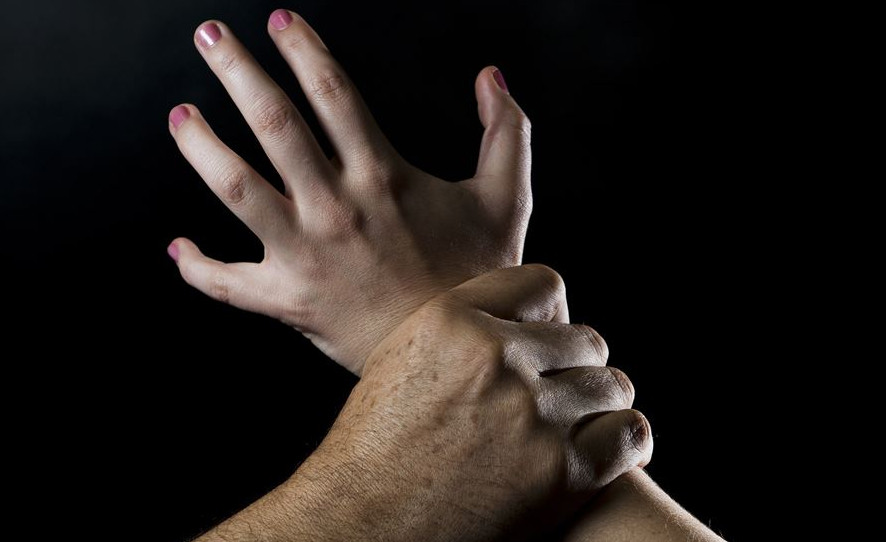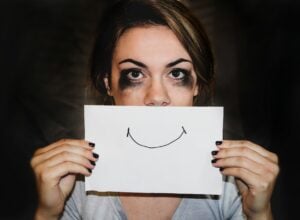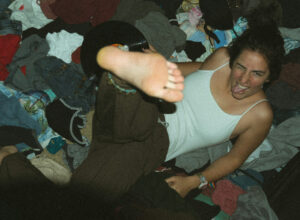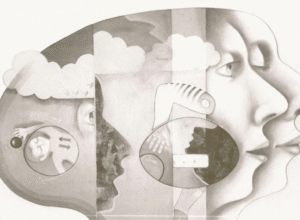W sierpniu tego roku dziewczyna została zaatakowana w centrum Warszawy. Mężczyzna bez koszulki szedł za nią, zaczepiał, chciał, by poszła z nim. Jednoznacznie odmawiała. W końcu rzucił nią o ulicę i pociągnął za nogi. Zaczęła krzyczeć. Żadna z osób w samochodach nie zareagowała. Centrum miasta, Warszawa. Kobieta wszystko nagrywała.
Policja zareagowała standardowo – ponieważ nie doszło do gwałtu ani morderstwa, a ofiara była „tylko” śledzona i rzucona o ziemię, kazano jej zgłosić się na komisariat. Tam także nie otrzymała pomocy. Sprawca uciekł. Po nagłośnieniu sprawy policja poinformowała, że złapała go i wykona czynności procesowe. Gdyby setki ludzi nie udostępniły nagrania w sieci, nie wiadomo, jak by się to potoczyło. Wiele przestępstw, jak naruszenie nietykalności cielesnej czy groźby karalne, ściganych jest z oskarżenia prywatnego. Jeśli do gwałtu czy pobicia nie doszło, nie ma co liczyć na wszczęcie sprawy z urzędu, a często i na jakąkolwiek pomoc policji. Oskarżenie prywatne trzeba napisać samemu lub z pomocą prawnika. Mało kto ma umiejętności, by zrobić to samodzielnie. Prawnik za taką usługę bierze od 3 do 10 tys. zł. Większości ludzi na to nie stać. Ich oprawcy chodzą wolno, niczym nieniepokojeni. Mogą krzywdzić dalej.
Jeśli oprawca jest zamożny, a ofiara z bezsilności i braku wsparcia policji publicznie wspomni o przemocy, jakiej się dopuścił, on może złożyć oskarżenie prywatne o zniesławienie czy znieważenie i wygrać. W takim kraju żyjemy.
Winna niezależnie od okoliczności
Publikacja nagrania wywołała falę wsparcia dla dziewczyny i oburzenie zachowaniem sprawcy. Policja pod naciskiem społeczności wydała komunikat. To nic nowego. Jakiś czas temu wraz z setkami użytkowników i użytkowniczek social mediów nagłośniliśmy sprawę stalkera, którego od miesięcy nie potrafiła bądź nie chciała złapać. Zrobiła to dzień po tym, jak sprawa zyskała rozgłos. Chłopak poniżał nastolatkę, groził jej, wstawiał na platformę X zdjęcia z jej miejsca zamieszkania i opisywał, jak zamierza ją skrzywdzić (m.in. zgwałcić – wyrażał nadzieję, że skutkiem będzie ciąża i że urodzi się syn). Dopiero po tym, jak sprawę opisały media, policja go znalazła i aresztowała.
Poza głosami wspierającymi zaatakowaną w Warszawie dziewczynę pojawiły się tysiące komentarzy ją obwiniających. Jak zwykle. Ludzie zaczęli wypominać, że zamiast od razu zadzwonić na policję, nagrywała zajście. Że myśli tylko o lajkach. Że nagrywając sprawcę, sprowokowała go do fizycznej napaści. Za to kiedy osoby nie mają niezbitych dowodów na przemoc, której doświadczyły, słyszą, że zmyślają albo pomawiają. Że chcą zniszczyć niewinnego człowieka. Że robią to dla atencji.
Ofiara w sposób niepozostawiający wątpliwości stawiała opór. W dyskusjach o przemocy zwykle słychać: „Sama chciałaś – dlaczego nie mówiłaś «nie»?”, „skąd on miał wiedzieć, że tego nie chcesz?”. Tym razem zdecydowany opór stał się argumentem przeciwko skrzywdzonej.
W tej optyce sprawca znika z krajobrazu. Nikt nie mówi, czego nie powinien robić. „Każdy wie, że nie można atakować czy rzucać człowiekiem o ziemię”. Nie. To pokrzywdzona zostaje obciążona odpowiedzialnością za „złe działania”, które podjęła bądź których nie podjęła.
Nie mówiła „nie”? Winna, widocznie tego chciała.
Mówiła „nie”? Winna, prokowała.
Nagrywała? Winna, bo go rozsierdziła.
Nie nagrywała? Winna, zmyśliła to sobie.
Równość kobiet i mężczyzn w byciu olewanym, gdy doświadczają przemocy
Ludzie z oburzeniem komentowali, że nikt dziewczynie nie pomógł, gdy ta krzyczała. Inni deklarowali, że sami by nie pomogli („chciałyście być niezależne, to macie”). Jakby czymś nagannym była walka kobiet o równouprawnienie, a nie ignorowanie przemocy, która dzieje się obok nas. Jeśli emancypacja kobiet sprawia, że „za karę” nie pomożesz im, gdy ich życie jest zagrożone – to mamy do czynienia ze śmiertelnie niebezpiecznym backlashem.
Za brak reakcji i nieudzielenie pomocy można odpowiedzieć także karnie. Grozi za to do trzech lat więzienia. Płeć osoby atakowanej i atakującej nie ma tu znaczenia. Jeśli ofiara to mężczyzna, nikt nie pisze, że nie zasługiwał na pomoc, bo jest samodzielny i niezależny. Ale mężczyznom też odmawia się pomocy, bo przecież „facet musi radzić sobie sam”. To dwie strony tej samej monety.
Na początku w tych reakcjach widziałam tylko mizoginię. Ona, rzecz jasna, też tam jest.
„Ja bym nie pomógł żadnej kobiecie. Chciały być niezależne, walczyć z mężczyznami i patriarchatem, to niech teraz radzą sobie same. Ja się odwrócę na pięcie i będę z satysfakcją patrzeć, jak zdychają lub są gwałcone” – podobnych komentarzy nie brakowało.
Ale pojawiły się też głosy pokazujące inne perspektywy lęku przed pomaganiem, nieuczciwie mieszane z tymi agresywnymi. Z jednej strony dotyczyły konsekwencji, które można ponieść, np. zarzutów o naruszenie nietykalności cielesnej wobec oprawcy. Z drugiej – pozycji mężczyzn w takim układzie.
Po jakimś czasie zdałam sobie sprawę, że deklaracje o niepomaganiu kobietom wynikają nie tylko ze złości na to, że są samodzielne i walczą o siebie, ale także na to, że według powszechnie przyjętych norm kobietom się pomaga (bo są „słabsze”), a mężczyznom nie. Wielu komentujących czuje, że gdyby to oni znaleźli się w sytuacji zagrożenia, nie otrzymaliby wsparcia. A niektórzy mają na koncie takie doświadczenia.
Widzimy to niemal wszędzie: podczas katastrof najpierw ratowane są kobiety i dzieci. Mężczyźni idą na stracenie. W wiadomościach o wypadkach czy wojnach często podaje się liczbę ofiar, a wśród nich wyróżnia „kobiety i dzieci”. Jakby śmierć mężczyzn była mniej znacząca. Na wojny wysyłani są mężczyźni – zmuszani do zabijania, narażania własnego życia i patrzenia na śmierć kolegów. Przemoc wobec mężczyzn kwitowana jest obśmianiem – dał się pobić, przegrał bójkę, jest słaby. Słaby jak kobieta. Pizda.
„Boys will be boys” – to nie tylko sposób na usprawiedliwianie przemocy mężczyzn wobec kobiet, ale także mężczyzn wobec mężczyzn. Kolega z klasy pobił innego chłopaka? Chłopcy tak mają. Rozrabiaki. Tymczasem pobity chłopiec może doznać traumy, która wpłynie na całe jego życie. Będzie przy tym ustawiany na równi ze swoim oprawcą, jakby po prostu „uczestniczył w bójce”. Jego krzywdy nikt nawet nie uzna za krzywdę – będzie musiał sobie z nią radzić zupełnie sam. Albo nie radzić.
Mało kto usprawiedliwiałby chłopca, który pobił dziewczynkę. Jeszcze do niedawna powszechnie bagatelizowano zachowania chłopców naruszające autonomię fizyczną koleżanek – jak ciągnięcie za warkocze czy popychanie. „Końskie zaloty”. Dzięki naszym reakcjom to się powoli zmienia. Ale wciąż, nie mniej niż przed laty, ignoruje się przemoc fizyczną między chłopcami, usprawiedliwiając ją „chłopięcą naturą”. Jakby fakt, że ofiara i sprawca dzielą płeć, zrównywał ich w odpowiedzialności.
„Męski kodeks honorowy: bronisz kobiet przed agresją zjebów” – tego typu komentarze ze strony konserwatystów mają stanowić przeciwwagę dla deklaracji obojętności na przemoc. Tylko dlaczego „męski kodeks honorowy” nie każe bronić mężczyzn przed „agresją zjebów”?
W serialach jeszcze niedawno normą były sceny, gdy kobiety w złości rzucały się na mężczyzn w kłótni czy dawały im z liścia, gdy nie spodobało im się coś, co powiedzieli. Mogły to robić, bo są kobietami. Bo są uznawane za słabsze. Bo hormony, poniosło ją. Bo jest impulsywna. To działa na niekorzyść zarówno kobiet (infantylizuje się je, robiąc z nich nie do końca świadome swoich działań histeryczki), jak i mężczyzn (przyzwala się na przemoc wobec nich).
Dla wielu komentujących równościowe traktowanie kobiet w obliczu agresji oznacza niepomaganie im. Bo sami są w ten sposób wystawiani – w szkole, na ulicy, ale też przez polityków, którzy chcą skazywać ich na obowiązkową służbę wojskową. W końcu pobór (mężczyzn) jest w Polsce tylko zawieszony. Pytani o to politycy nie wyrażają chęci zmiany sytuacji czy choćby gotowości do rozmów na ten temat.
Boimy się nocą wychodzić z domu. Mężczyźni też
Kobiety z doświadczeniem przemocy czasem boją się mężczyzn. Mogą próbować się od nich odciąć i razem z innymi kobietami wspierać się w przestrzeniach zarezerwowanych wyłącznie dla kobiet. A mężczyzna skrzywdzony przez innego mężczyznę? Pomocowa przestrzeń bez mężczyzn – to przestrzeń bez niego.
Gdy taki facet słyszy, że „lepiej spotkać w lesie niedźwiedzia niż mężczyznę” – z jednej strony może się z tym zgodzić, bo sam doświadczył męskiej przemocy. Z drugiej, sam jest mężczyzną – i ofiarą jednocześnie. Nie jest gorszy od niedźwiedzia. On też był obwiniany za to, że „dał się”, że „nie umiał się obronić”, że „nie jest prawdziwym facetem”.
Jako kobiety po przemocy powtarzamy, że boimy się nocami wychodzić z domu. Nie jesteśmy w tym same. Rozmawiałam z mężczyznami, którzy na widok innych mężczyzn nocą reagują tak jak my – lękiem, zaciśnięciem kluczy w dłoni czy sięgnięciem po gaz pieprzowy. Różnica polega głównie na tym, że częściej jest to lęk przed przemocą fizyczną niż seksualną.
Kiedy twoja własna płeć jest przedstawiana jako zła i toksyczna, a sam jesteś ofiarą kogoś, kto tę płeć z tobą dzieli – możesz zacząć się nienawidzić. Możesz nawet czuć, że nic takiego się nie stało. „Trudno, przegrałem bójkę” – myślisz, gdy przypominasz sobie, jak skatował cię obcy mężczyzna nocą, bo nie spodobały mu się twoje spodnie. W końcu jesteś facetem, musisz to wziąć na klatę. Zaczynasz czuć się winien nie tylko tego, jak (nie) zareagowałeś, ale i tego, że po prostu jesteś. Jesteś mężczyzną. To takie splątanie winy i wstydu, którego jako kobiety nigdy nie doświadczymy.
Najczęstszą formą przemocy fizycznej jest ta mężczyzn wobec mężczyzn. Robienie z męskości kawałka tożsamości wcielonego zła i źródła agresji to sposób na retraumatyzację męskich ofiar. Jest to także krzywdzące dla tych, którzy nie są ani ofiarami, ani sprawcami.
To nie w byciu mężczyzną leży problem – tylko w przemocy i społecznym przyzwoleniu na nią, normalizowaniu jej, a nawet gloryfikowaniu. Influencerzy docierający do dzieci to często agresorzy i kryminaliści, którzy z krzywd, jakie wyrządzili, robią powód do dumy, zaś tych, którzy ich zgłaszają, poniżają jako „60” czy „konfidentów”. Wydarzenia z ich udziałem są promowane także przez media mainstreamowe, duże stacje telewizyjne czy Stadion Narodowy.
„To weź ogarnij przedstawicieli swojej płci. To wy odpowiadacie za przestępstwa” – doradzają czasem kobiety, gdy mężczyzna sprzeciwia się zrównywaniu go z agresorami. Tylko jaki on ma wpływ na miliardy obcych mu ludzi, z którymi łączy go tylko płeć? Jak ma ich „ogarnąć”? A jeśli sam doświadczył przemocy od mężczyzny – jaki ma wpływ na tego, kto go skrzywdził?
Oczywiście każda osoba może reagować na przemoc. Najlepiej jednak, byśmy robili to razem – nie dzieląc się według płci i nie rozliczając w oparciu o nią. Dzięki temu oprawcy nie będą bezkarni, a ci, którzy reagują – odosobnieni.
Przemoc nie ma płci?
Może warto porzucić określenie „przemoc ma płeć” na rzecz „przemoc ma konsekwencje”? Bo z tymi konsekwencjami dla sprawców i sprawczyń wciąż nie jest najlepiej. A zrzucanie obciążania na płeć odciąża sprawcę, który zdecydował się skrzywdzić – współodpowiedzialna staje się połowa świata, a nie ten konkretny człowiek i ludzie, którzy go chronią (nierzadko są to kobiety). Winni znikają, wina się rozmywa. Ani to nie karze sprawcy, ani nie poprawia sytuacji pokrzywdzonych.
Gdy rozmawiam z mężczyznami z doświadczeniem przemocy, widzę, że łączy mnie z nimi znacznie więcej niż z kobietami, które mają zupełnie inne przeżycia. Nasze reakcje, poczucie wstydu i winy, często są podobne. Łatwiej mi utożsamić się z mężczyzną, który był skrzywdzony i przeżył wiele bólu, niż z bizneswoman, która zdobywa fortunę dzięki wyzyskowi pracowników na najniższej krajowej i nie ma skrupułów, by stanąć w obronie swojego ustawionego kolegi, który stosował przemoc seksualną wobec pracownic. Łączy mnie z nią płeć – dzieli znacznie więcej. Taka kobieta często szafuje hasłem „siła kobiet” czy rości sobie prawo do bycia przedstawicielką nas wszystkich, mimo iż z większością ma niewiele wspólnego: bliżej im do jej wyzyskiwanych pracowników niż do niej samej.
Dlaczego zatem to męscy sprawcy przemocy – będący w mniejszości wobec wszystkich mężczyzn – mieliby reprezentować wszystkich, nawet jeśli większość nie chce mieć z nimi nic wspólnego?
Rozumiem, jakie intencje kryją się za figurami „przemoc ma płeć” czy „wolę spotkać w lesie niedźwiedzia niż mężczyznę” i może w pewnym historycznym momencie miały one sens, by ukazać systemowy charakter zjawiska – chodzi o obrazowe przedstawienie skali przemocy wobec kobiet oraz społecznego przyzwolenia na nią i na wiktymizację pokrzywdzonych. Problem w tym, że tej wiktymizacji doświadczają także skrzywdzeni mężczyźni, a język i jego figury zmieniają się wraz z rozwojem świadomości społecznej.
Feminizm to ciągły ruch i ciągła zmiana – każda kolejna fala to dostrzeżenie, że we wcześniejszych walkach jakaś dyskryminowana grupa została pominięta: osoby ciemnoskóre, niezamożne, transpłciowe czy niebinarne. Może czas najwyższy zauważyć też wykluczaną grupę mężczyzn?

 Wspieraj
Wspieraj 

 Wspieraj
Wspieraj  Wydawnictwo
Wydawnictwo 
 Zaloguj się
Zaloguj się 
















